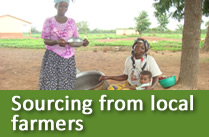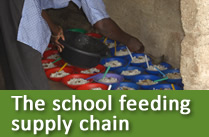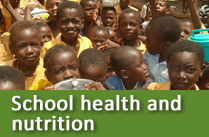Welcome to HGSF-Global.org/ghana
Government has released twelve pick-ups and five station wagons all valued at GH¢1. 3 million to Regional Coordinators of the Ghana School Feeding Programme and the National Secretariat.
According to the Deputy Minister of Local Government and Rural Development, Acquinas Quansah, the vehicles are aimed at improving the mobility of the Coordinators for the effective monitoring of the programme.
There are currently one-point-three million school children under the programme and the number is expected to increase to one-point-five million next year.
Mr. Quansah expressed hope that the vehicles will be used to effectively monitor the quality and quantity of food provided to school children under the programme.
Read more: Government presents vehicles to Ghana School Feeding Programme
November 16: The government of Ghana has outlined plans for the Ghana School Feeding Programme (GSFP) in a budget statement read in parliament last week by the Finance Minister.
The budget statement themed ‘Infrastructural Development for Accelerated Growth and Job Creation’ emphasized three areas for attention in 2012 including the following:
- To guide GSFP and other school feeding programmes, a National School Feeding Policy will be developed.
- Steps will be taken to expand the Programme to cover 1,500,000 pupils
- For the implementation of the above activities an amount of GH¢223,272,127 has been allocated.
Download 2012 Budget Statement
More than 520 smallholder rice producers belonging to 10 farmer organizations in the Tamale and Tolon-Kumbungu Districts of the Northern Region are attending a three-day capacity-building training to enable them to become competitive players in the marketplace.
The programme is part of the World Food Programme's (WFP) "Purchase for Progress" (P4P) initiative and is being funded by the Canadian International Development Agency (CIDA).
In an address read for him at the opening ceremony in Tamale on Tuesday, the WFP Representative/Country Director for Ghana, Mr Ismail Omer, said the broader goal of the P4P initiative was to increase income levels, improve food security and nutrition, and reduce poverty among participating smallholder and low-income farmers.
Read more: Smallholder rice producers receive capacity-building training
After six years of implementing home-grown school feeding as a social intervention and poverty reduction strategy, the Ghana School Feeding Programme has given the strongest indication yet towards developing a national school feeding policy.
In a technical workshop last week 5th November, 2011, featuring school health and nutrition experts from the World Bank, World Food Programme and Partnership for Child development, as well as local partners and the Ghana School Feeding Programme managers, the programme outlined tentative steps, starting from 6th October, 2011 and ending with a policy launch in September 2012.
The next major step will be to subject the tentative steps to scrutiny in a National Stakeholder Workshop on the 20th and 21st October 2011. Read more about the next major steps
Ghana operates a unique and one of the largest school feeding programmes on the African continent presently feeding about 1,040,747 school children. The Ghanaian school feeding resides in the ministry for local government and rural development but requires effective collaboration from the Education, Health and Agriculture ministries.
Programme implementers believe that a good national school feeding policy and eventual legislation could elicit the needed collaboration among collaborating ministries, wean the programme from unnecessary political interference and secure its sustainability across governments.
School Feeding Initiative Ghana Netherlands (SIGN), a Dutch-based platform, that has been supporting the Ghana School Feeding Programme (GSFP) for the past 6 years, is organizing a conference on Home Grown School Feeding (HGSF).
The conference will seek to share or transfer knowledge and experiences on multi stakeholder cooperation in support of the GSFP. Focus areas will include experiences with the SIGN model as a way to support the GSFP, partnerships formed around the GSFP and opportunities for future cooperation on Home Grown School Feeding. Experiences on other critical themes like Social Accountability, Leadership and Good Governance and effective linkage with smallholder farmers will also be shared.
These objectives will be fulfilled through presentations and panel discussions centred on SIGN’s six years of collaboration with policy makers, civil society, business people and researchers on the GSFP.
The conference is scheduled to take place in late October 2011 in the Netherlands and will be opened by Her Excellency Mrs. Aanaa N. Enin; Ghana’s Ambassador to the Netherlands and closed by Dr. Ben Knapen, Dutch Minister for International Cooperation. Other invitees include the strategic partners of the GSFP, interested parties in HGSF, Media personnel and partners of SIGN
Leading up to the conference, the Centre for Learning on Sustainable Agriculture is hosting an online debate around the following statement: “HGSF programs have the potential to not only benefit children but small scale farmers as well: because food necessities can be procured locally, a new market may be created for farmers. But is it a worthwhile investment in terms of scale and possible economic benefits?”
Carmen Burbano (Policy Officer at the World Food Programme) and King-David Amoah (Director ECASARD Ghana) initially take a stand. Interested in what they have to say? Join the debate!
For more information about the program, registration or following SIGNs blog, visit the SIGN website
Page 3 of 4
 |
|||||
|
 |
|
From smallholder farmers to cooks and caterers to teachers and school-children, they comprise all elements of the school feeding supply chain and are integral to programme design and implementation. |
 |
|||||
|
 |
|
|
 |
|||||
|
 |
|
|





